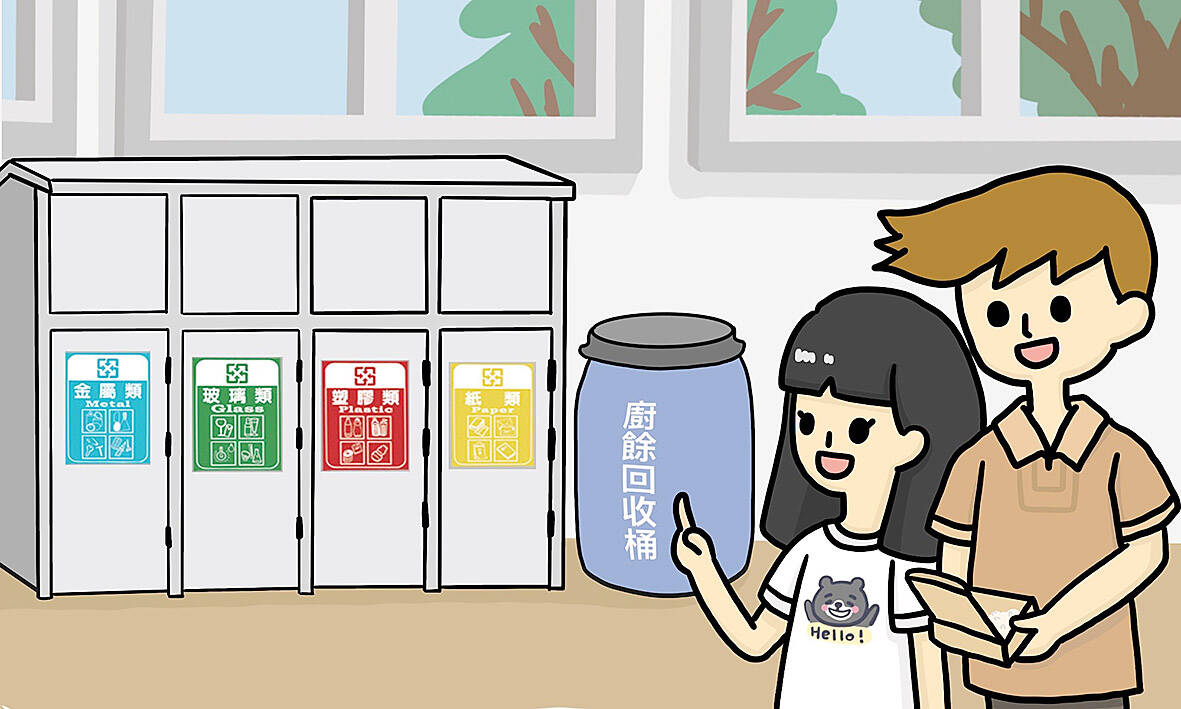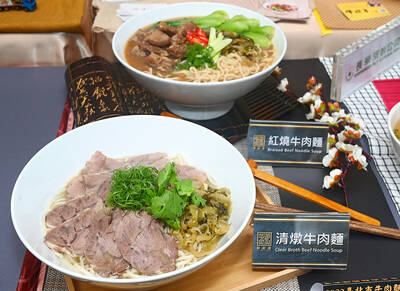對話 Dialogue
小實:馬克,你的便當裡還有飯菜嗎?
Xiǎoshí: Mǎkè, nǐ de biàndāng lǐ hái yǒu fàncài ma?

馬克:還剩下一點飯,怎麼了?
Mǎkè: Hái shèng xià yìdiǎn fàn, zěnmele?
小實:你得先把剩下的飯菜倒進廚餘桶裡,才能丟掉便當盒喔。
Xiǎoshí: Nǐ děi xiān bǎ shèng xià de fàncài dào jìn chúyú tǒng lǐ, cáinéng diūdiào biàndāng hé ō.
馬克:喔,所以垃圾桶上才有不同的標示。
Mǎkè: Ō, suǒyǐ lèsè tǒng shàng cái yǒu bùtóng de biāoshì.
小實:沒錯,臺灣常見的垃圾分類有一般垃圾、廚餘和資源回收。
Xiǎoshí: Méicuò, táiwān chángjiàn de lèsè fēnlèi yǒu yìbān lèsè, chúyú hàn zīyuán huíshōu.
馬克:我知道吃剩的飯菜是廚餘類,那資源回收呢?
Mǎkè: Wǒ zhīdào chī shèng de fàncài shì chúyú lèi, nà zīyuán huíshōu ne?
小實:像是紙類、塑膠類這些都要回收喔,比方說便當紙盒和飲料瓶。
Xiǎoshí: Xiàng shì zhǐ lèi, sùjiāo lèi zhèxiē dōu yào huíshōu ō, bǐfāng shuō biàndāng zhǐ hé hàn yǐnliào píng.
馬克:上面還寫了金屬類和玻璃類,這些也都要回收嗎?
Mǎkè: Shàngmiàn hái xiěle jīnshǔ lèi hàn bōlí lèi, zhèxiē yě dōu yào huíshōu ma?
小實:對啊!完善的資源回收能減少垃圾量喔。
Xiǎoshí: Duì a! Wánshàn de zīyuán huíshōu néng jiǎnshǎo lèsè liàng ō.
馬克:我懂了,臺灣的資源回收做得真好!
Mǎkè: Wǒ dǒng le, táiwān de zīyuán huíshōu zuò de zhēn hǎo.
翻譯 Translation
Xiaoshi: Mark, is there any food in your lunch box?
Mark: There’s still some food left. What’s wrong?
Xiaoshi: You have to dump the remaining food into the kitchen waste bucket before throwing away the lunch box.
Mark: Oh, that’s why the trash cans have different markings.
Xiaoshi: Yes, common garbage classifications in Taiwan include general garbage, food waste and recycling.
Mark: I know that leftover food is food waste, but what about “recycling”?
Xiaoshi: Paper and plastics, such as lunch boxes and drink bottles, must be recycled.
Mark: It also says metal and glass. Do these also have to be recycled?
Xiaoshi: Yes! Complete recycling can reduce the amount of garbage.
Mark: I understand. Taiwan’s resource recycling is really good!
單字片語 Vocabulary
1. 剩下 (shèngxià) to be left (over)
2. 廚餘 (chúyú) kitchen waste
3. 標示 (biāoshì) indication
4. 分類 (fēnlèi) classification
5. 資源 (zīyuán) resource
6. 回收 (huíshōu) to recycle
7. 完善 (wánshàn) complete
8. 減少 (jiǎnshǎo) to reduce
教材音檔 Audio Files
教材影片 Video Files:
https://www.instagram.com/celc.nou_tw/guide/_/17999106352646292/
實踐大學華語中心提供
By Shih Chien University Chinese Language Center: https://chineseusc.com/

US President Donald Trump has renewed his ambition to take control of Greenland for national security reasons and questioned whether Denmark has any legal right to the Arctic island. The debate has revived scrutiny of how Greenland became part of Denmark, its current self-rule and path to independence, and Washington’s military footprint. HOW DID DENMARK GET GREENLAND? Greenland was inhabited by Inuit peoples from Asia and North America intermittently from around 2,500 BC. Around 985 AD, Vikings led by Erik the Red settled in southern Greenland, farming and building churches. Around the same time, ancestors of today’s Inuit arrived, living as hunters

A: Bloomberg just released its annual travel guide, titled “25 Best Places to Travel in 2026.” What were the best Asian destinations? B: There were actually six Asian hotspots: Taiwan’s Taipei, Malaysia’s Penang, Kazakhstan’s Almaty, Indonesia’s Rote Island, India’s Tiger Reserves, and Oman. A: With its mix of traditional food and modern cuisine, Taipei has become a rising food capital in Asia. B: As Bloomberg reported, “Taiwan is a place that bubbles up in culinary conversation because of its famed beverage, bubble tea, and its early adoption of modern night markets.” A: And Din Tai Fung has now

A: In its latest annual travel guide, Bloomberg recommended two restaurants in Taipei: Golden Pig barbeque from South Korea and two-Michelin-star restaurant A. B: Also, tourists should definitely try Taiwanese cuisine while they’re here. Mountain & Sea House, Shin Yeh Taiwanese Cuisine, and Fujin Tree Taiwanese Cuisine & Champagne are good options. A: For local snacks, Fu Hang Soy Milk, Fu-Ba-Wang Pigs’ Knuckles Restaurant, and Wang Ji Rice Dumplings are all very popular. B: And the gold medalists of the 2025 Taipei International Beef Noodle Festival — Yun Shui Kitchen, The Howard Plaza Hotel Taipei, and Come N’ Eat

Owls have long fascinated people with their distinctive appearance and mysterious habits. These nocturnal birds possess large, round eyes and a flat facial disc. Their feathers come in shades of brown, gray, or white, helping them blend easily into the darkness. The most remarkable trait of owls is that they can turn their heads without damaging blood vessels. Contrary to popular belief, they can only rotate their heads up to 270 degrees, not 360 degrees. Owls have 14 cervical vertebrae, which is twice as many as humans. This special physical structure compensates for their inability to move their eyes within their